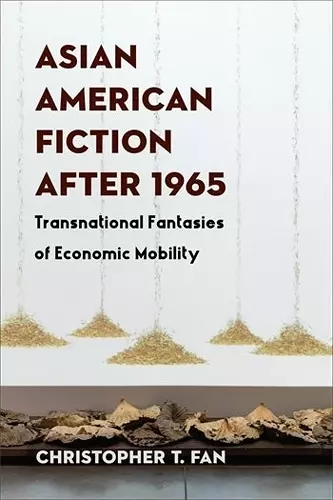Asian American Fiction After 1965
Transnational Fantasies of Economic Mobility
Format:Paperback
Publisher:Columbia University Press
Published:23rd Apr '24
Currently unavailable, and unfortunately no date known when it will be back

After the 1965 Immigration and Nationality Act loosened discriminatory restrictions, people from Northeast Asian countries such as South Korea, Taiwan, Japan, and eventually China immigrated to the United States in large numbers. Highly skilled Asian immigrants flocked to professional-managerial occupations, especially in science, technology, engineering, and math. Asian American literature is now overwhelmingly defined by this generation’s children, who often struggled with parental and social expectations that they would pursue lucrative careers on their way to becoming writers.
Christopher T. Fan offers a new way to understand Asian American fiction through the lens of the class and race formations that shaped its authors both in the United States and in Northeast Asia. In readings of writers including Ted Chiang, Chang-rae Lee, Ken Liu, Ling Ma, Ruth Ozeki, Kathy Wang, and Charles Yu, he examines how Asian American fiction maps the immigrant narrative of intergenerational conflict onto the “two cultures” conflict between the arts and sciences. Fan argues that the self-consciousness found in these writers’ works is a legacy of Japanese and American modernization projects that emphasized technical and scientific skills in service of rapid industrialization. He considers Asian American writers’ attraction to science fiction, the figure of the engineer and notions of the “postracial,” modernization theory and time travel, and what happens when the dream of a stable professional identity encounters the realities of deprofessionalization and proletarianization. Through a transnational and historical-materialist approach, this groundbreaking book illuminates what makes texts and authors “Asian American.”
Sparkling with intelligence and erudition, Christopher Fan’s book boldly reconceives post-1965 Asian American literature. Linking authorship to economic subject formation and the global shift in capital accumulation to Northeast Asia, Fan theorizes literary form as shaped by the conflict between scientific professionalism and artistic practice. A must-read for everyone who escaped a STEM career. -- Jini Kim Watson, author of Cold War Reckonings: Authoritarianism and the Genres of Decolonization
Christopher Fan’s powerful reframing of Asian American fiction forces us to rethink the field from the ground up. It is a highly convincing and consequential achievement, a work of literary historical contextualization replete with deft new readings of major figures and texts. -- Mark McGurl, author of Everything and Less: The Novel in the Age of Amazon
Christopher Fan offers an ambitious and original way to think about why Asian American literature took off in the way it did in the 1990s. His well-researched book provides nuanced readings, isn’t afraid to court controversy, and is written in a clear, cogent style. -- Min Hyoung Song, author of Climate Lyricism
Christopher Fan’s book remakes the field of Asian American literature, reconceiving it in richly transnational and material terms. Driven at once by exceptional close readings and inventive historical research, Asian American Fiction After 1965 is in fact a master class in how to write about contemporary fiction as such. -- Andrew Hoberek, author of Considering Watchmen: Poetics, Property, Politics
This is a rigorous work of scholarship that includes extensive research and notes, and offers an innovative understanding of Asian American authors. * Choice Reviews *
A must-read for anyone who studies or teaches contemporary Asian American literature. * MELUS *
ISBN: 9780231213233
Dimensions: unknown
Weight: unknown
320 pages